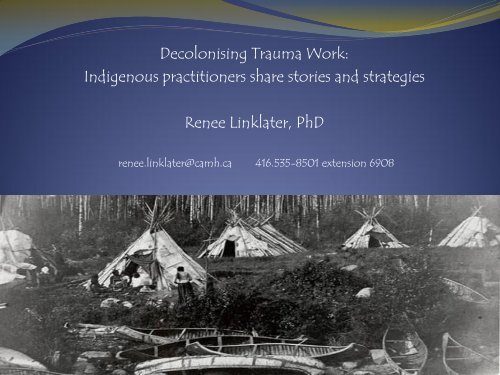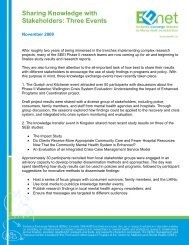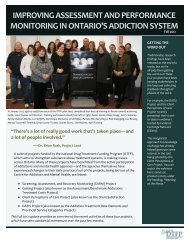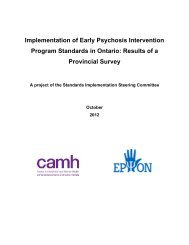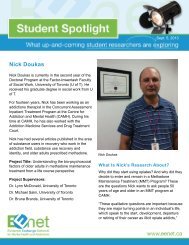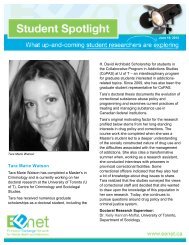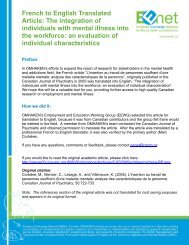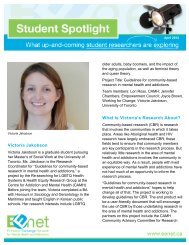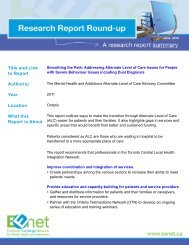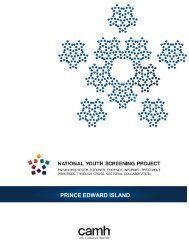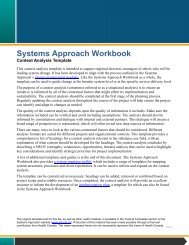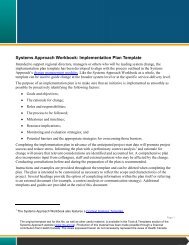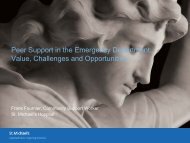Decolonising Trauma Work: Indigenous practitioners share ... - EENet
Decolonising Trauma Work: Indigenous practitioners share ... - EENet
Decolonising Trauma Work: Indigenous practitioners share ... - EENet
You also want an ePaper? Increase the reach of your titles
YUMPU automatically turns print PDFs into web optimized ePapers that Google loves.
<strong>Decolonising</strong> <strong>Trauma</strong> <strong>Work</strong>:<br />
<strong>Indigenous</strong> <strong>practitioners</strong> <strong>share</strong> stories and strategies<br />
Renee Linklater, PhD<br />
renee.linklater@camh.ca 416.535-8501 extension 6908
<strong>Decolonising</strong> trauma work: <strong>Indigenous</strong><br />
<strong>practitioners</strong> <strong>share</strong> stories and strategies<br />
Worldviews<br />
<strong>Indigenous</strong> Approaches to Wellness and<br />
Wholistic Health<br />
Critiquing Psychiatry<br />
<strong>Indigenous</strong> Strategies for helping clients that experience<br />
trauma, depression, and parallel and multiple realities
We are resilient people<br />
with many strengths
What is trauma?<br />
an emotional shock that may have long-lasting effects (Collins<br />
English Dictionary, 2006)<br />
In traumatic situations, all those integrated components of the<br />
embodied response–arousal, attention, perception and emotion–<br />
tend to persist in altered and exaggerated state long after the<br />
specific danger is over (O’Neill, 2005)<br />
<strong>Trauma</strong> is not a disorder but a reaction to a kind of wound. It is a<br />
reaction to profoundly injurious events and situations in the real<br />
world, and indeed a world in which people are routinely wounded<br />
(Burstow, 2003)
Soul Wound<br />
a wound to the soul of Indian people that is felt in agonizing<br />
proportions…. Once the core from which soul emerges is wounded<br />
then all emerging mythology and dreams of a people reflect the<br />
wound (Duran, 1990)<br />
spiritual injury, soul sickness, soul wounding, and ancestral hurt<br />
Historical <strong>Trauma</strong><br />
Historical trauma is trauma that is multigenerational and cumulative<br />
over time; it extends beyond the lifespan. Historical trauma response<br />
has been identified and is delineated as a constellation of features in<br />
reaction to the multigenerational, collective, historical, and<br />
cumulative psychic wounding over time, both over the lifespan and<br />
across generations.” Yellow Horse Brave Heart-Jordan (1995)
Love<br />
Being in Creation<br />
Respecting different worldviews<br />
Honouring the Spirit and spirituality<br />
Interconnectedness, Circles, and Medicine Wheel approaches<br />
Cultural and ceremonial resources<br />
Identity development<br />
Relationships – connecting to family and community<br />
Teaching and educating<br />
Restorative justice<br />
Critiquing the use of psychiatric diagnoses and medication<br />
Impact of diagnoses on identity<br />
Cultural assessment<br />
Being open to a different reality<br />
Non-pathological frameworks
Wellness<br />
“Wellness is balance between all parts of yourself, not just being<br />
in balance intellectually or not having negative feelings. It’s more<br />
a matter of being centred and grounded, and connected to<br />
everybody and being in harmony with everybody…or not with<br />
everybody but with the way life is…with your surroundings and<br />
with your family.”<br />
Nina Desjardins – Cree Métis Psychiatrist
“Wellness among <strong>Indigenous</strong> peoples in Mexico, or in the part<br />
where I live, concerns social, family, community, balance…it<br />
concerns everything. The way they define illness and the way a<br />
healer deals with a person is: has she done her proper devotions?<br />
Her proper rituals? How is she doing with her family? Is she well<br />
with the community? Does she have a problem with<br />
neighbours? Has she stolen something from someone? How is<br />
she economically, is she able to survive with whatever she has?”<br />
Sylvia Marcos – Tlaxcaltec Psychologist
Wholistic Health<br />
“It’s so different for every individual. Like, you can’t have a<br />
structure and impose it on every individual. The individual’s<br />
issues or challenges will notify me or tell me how I should<br />
work with that person.”<br />
Darlene Auger – Cree Therapist/Healer/Facilitator/Teacher
“We are trying to look at our treatments that are really working<br />
with our American Indian peoples here and one thing that we are<br />
seeing that really works is incorporating the cultural component.<br />
It’s just amazing what’s it’s done instead of traditional<br />
psychotherapy. Because often times I think that a lot of our<br />
people, especially in an urban area such as Los Angeles, have lost<br />
a lot of that cultural identity and so exposing them to that has<br />
been the most effective in terms of their own overall wellness.”<br />
Carrie Johnson – Dakota Sioux Psychologist
Critiquing Psychiatry<br />
“In the mental health field, I look at what kind of medications are<br />
they on? What kind of diagnosis do they have? I try not to have<br />
them feel bad, or feel a stigma about what kind of diagnosis<br />
[they’ve been given]…I think there’s a lot of stigma, so sometimes<br />
when I meet somebody, they’re embarrassed. I have one client<br />
who does not like to be called ‘schizophrenic.’ And…and nobody<br />
does. I like to say that she lives with ‘schizophrenia’…she prefers to<br />
be considered to have a mood disorder.”<br />
Janice St. Germaine – Anishinaabe Social <strong>Work</strong>er
“Sometimes they’re labelled with these different terms... sometimes they<br />
are ‘schizophrenic,’ and sometimes they’re other terms. But in the<br />
meantime, that’s not what it is…they’re receiving. They’re receiving<br />
something from their culture: who they are as Anishinaabe people. But<br />
that’s been overlooked too many times because we’re never being<br />
asked, ‘What’s going on with this person? Can you help?’ Elders are<br />
always being bypassed, that’s what I’m finding all the time.”<br />
Gilbert Smith – Anishinaabe Cultural Therapist
<strong>Indigenous</strong> Strategies<br />
“I think prayer. People forget about prayer, and I’ve told people a lot<br />
‘to pray,’ because that’s a huge part of our philosophy, is just to<br />
pray.”<br />
Janice Linklater – Anishinaabe Provisional Psychologist
“Teaching women how to get grounded. There’s a woman who came to<br />
see me a few years ago… sometimes when she would talk about her<br />
sexual violence in her childhood …we would do some visualizations.<br />
She didn’t like me to call ‘em that, so we just called it ‘That thing we<br />
do’. ‘That thing we do’ was about bringing her to a lake and washing<br />
herself off. Like washing the child, drying her off, using the light from<br />
the Creator…the heat from the Creator’s light to dry her, and then to<br />
get her to dress in her regalia and put on her little moccasins and her<br />
hairpieces. She had them in her daily life, but she would put them on<br />
this little girl that she was taking care of - which was her - or her spirit.<br />
It was definitely her spirit that she was caring for.”<br />
Tina Vincent – Algonquin Counsellor
“Depression has to do with telling their story and understanding what it<br />
is that has brought a sadness to them, that is a lasting sadness…<br />
Sometimes it can be just a talk therapy which is going back into the<br />
past of their memories, their childhood, of what they recall and just<br />
having them tell their story. And then helping them where they get<br />
stuck, where they have blanks in their memory of their story to then<br />
reconnect with using different approaches of ceremony and ritual to<br />
help them clarify that, to help them find it. Sometimes that is through<br />
a Pipe Ceremony, it can be through the Shaking Tent, or it can come<br />
through a Sweat Lodge.”<br />
Ed Connors – Mohawk Psychologist
“For people who are adversely affected by chaos, I try to bring them<br />
literally into relationship with other beings, like trees. There’s nothing<br />
in the world that’s more grounding for someone who is frightened or<br />
distressed by their difficulties in dealing with multiple realities. See, the<br />
funny thing is, is that for us as helpers who are working with people<br />
who are experiencing multiple realities - first of all, we have to have the<br />
capacity to deal with multiple realities.”<br />
Yvon Lamarche - Métis (Anishinaabe, Wendat, Scottish, and French) –<br />
Psychiatric Nurse
References<br />
Brave Heart-Jordan, M. Y. H. (1995). The return to the sacred path: Healing from historical trauma and<br />
historical unresolved grief among the Lakota. Unpublished doctoral dissertation. Smith College<br />
School of Social <strong>Work</strong>. Northampton, MA.<br />
Brave Heart, M. Y. H. (2004). The historical trauma response among Natives and its relationship to substance<br />
abuse: A Lakota illustration. In E. Nebelkopf, & M. Phillips (Eds.), Healing and mental health for<br />
Native Americans: Speaking in red (pp. 7-18). Lanham, MD: AltaMira Press.<br />
Burstow, B. (2003). Toward a radical understanding of trauma and trauma work. Violence Against Women,<br />
9(11), 1293-1317.<br />
Duran, E. F. (1990). Transforming the soul wound: A theoretical and clinical approach to Native American<br />
psychology. Berkley, CA: Folklore Institute.<br />
Duran, E. F. (2006). Healing the soul wound: Counseling with American Indian and other Native peoples.<br />
New York, NY: Teachers College, Columbia University.<br />
Duran, E., Duran, B., Brave Heart, M. Y. H., & Yellow Horse-Davis, S. (1998). Healing the American Indian soul<br />
wound. In Y. Danieli (Ed.), International handbook of multigenerational legacies of trauma (pp.<br />
341-354). New York, NY: Plenum Press.<br />
O’Neill, E. (2005). Holding flames: Women illuminating knowledge of s/self transformation. Unpublished<br />
doctoral dissertation. Ontario Institute for Studies in Education of the University of Toronto,<br />
Ontario, Canada.
Miigwech to:<br />
•Manitou Rapids-Rainy River First Nations<br />
•Baagwating Community Association<br />
•University of Toronto /McMaster University <strong>Indigenous</strong> Health Research Development<br />
Program Graduate Scholarship and Research Support<br />
•First Nations House at University of Toronto, OISE/University of Toronto,<br />
•National Aboriginal Achievement Foundation<br />
• Foundation for the Advancement of Aboriginal Youth<br />
•Casino Rama<br />
for providing financial support for my research journey.


